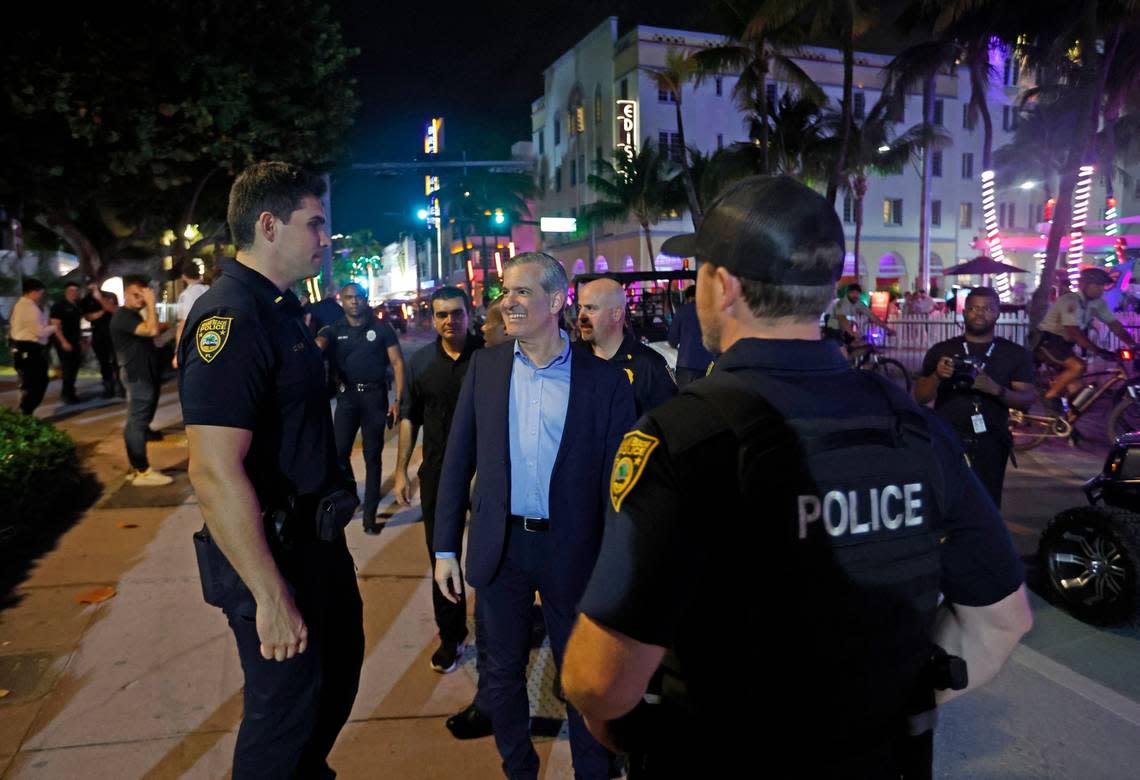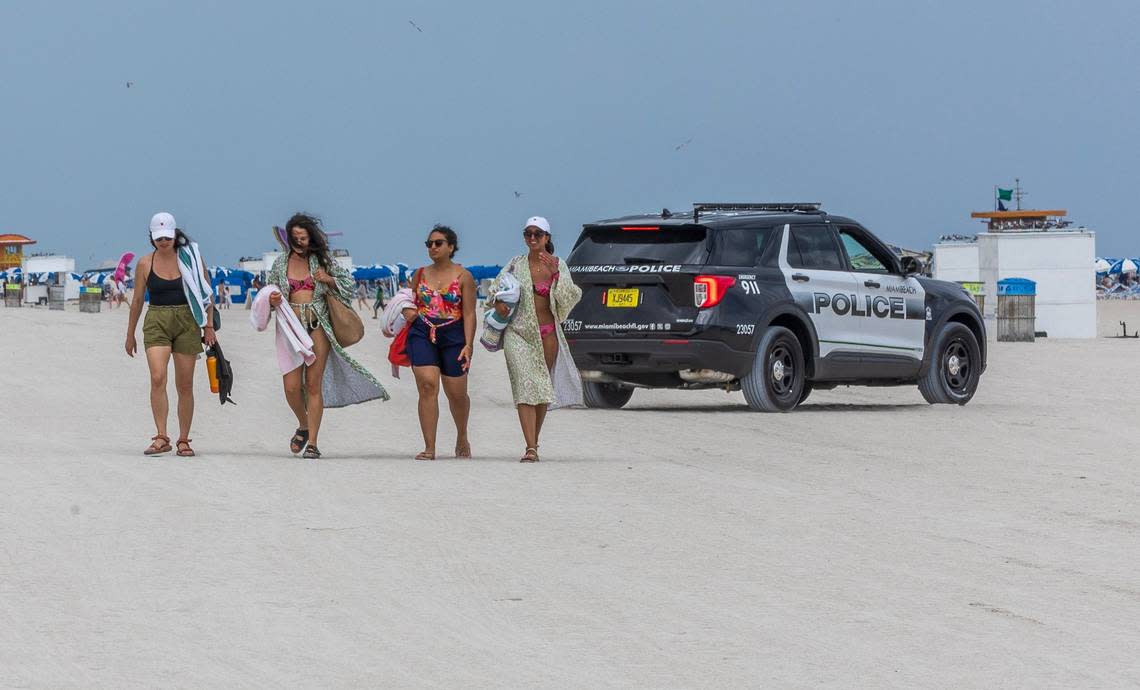Miami Beach spring break measures are keeping crowds away. Next weekend is a bigger test
On Ocean Drive this past weekend, it seemed everyone had seen the video.
Young visitors may not have read about Miami Beach’s spring break crackdown in the local newspaper. They certainly hadn’t watched the City Commission meetings where elected officials voted for draconian measures, including $100 parking fees and 6 p.m. beach closures. But the viral video in which the city announced it was “breaking up with spring break” had come across their timelines on TikTok, Instagram and other social media platforms.
“Of course we did,” Josh Pryor, 21, a senior at Georgia State University visiting for spring break, said Friday when asked if he and his friends had seen the video. “It’s everywhere.”
Melissa Berthier, the city’s marketing and communications director, said the broad spring break “breakup” campaign, including the video, had an estimated 220 million social media impressions. The city collaborated with the Greater Miami Convention and Visitors Bureau on the campaign, which also included the purchase of two billboards in the Miami area.
So far, the city’s messaging — along with measures like a DUI checkpoint and license-plate readers on major causeways — seems to be having the desired effect.
Unlike in past years on weekends around the same time in March, large crowds haven’t gathered on the beach during the day and flooded Ocean Drive at night. There haven’t been impromptu parties along side streets. The iconic South Beach strip was still buzzing with activity this past weekend — but aside from the spring break restrictions and massive police presence, it felt much like a typical weekend in South Beach.
City Commissioner Alex Fernandez, who pushed for the city to preemptively announce this year’s spring break measures, like parking restrictions and the possibility of curfews, said the messaging campaign is working.
“That’s the big difference,” Fernandez said in an interview. “A lot of the things we had already done in the past, but they were just not communicated in the robust, proactive way we did now.”
On Monday morning, Fernandez sent an email to constituents celebrating the calm start to spring break this past weekend, the first weekend in which the city’s strictest measures were in place. They will be enacted again next weekend.
“No shootings. No stampedes. No fatalities. What a difference!” Fernandez wrote.
An unprecedented law enforcement presence, with dozens of officers from 18 local, state and federal agencies, is patrolling the area this month. Among them are police from Miami Beach, Miami and Miami-Dade County, Florida Highway Patrol troopers provided by Gov. Ron DeSantis, and even FBI officers.
Miami Beach Mayor Steven Meiner, who was elected in November on a “law and order” platform, greeted officers on Ocean Drive Saturday night.
“Safety is our top priority and we’re extremely grateful for law enforcement’s presence,” Meiner wrote that night on Facebook.

But not everyone has been supportive of the city’s messaging. At a March 5 meeting, members of the city’s Black Affairs Advisory Committee said that, while they appreciated efforts by police and volunteer “goodwill ambassadors” to keep spring breakers safe, they hadn’t been consulted on the media campaign, which they believe sends an unwelcoming message to Black visitors. The group asked one of its members, attorney and former Miami-Dade State Attorney candidate Melba Pearson, to draft an op-ed on behalf of the committee to express its opposition.
Glendon Hall, who leads the committee, said Sunday in an interview with WPLG that he believes the messaging is “toxic” and negative, rather than encouraging people to visit Miami Beach in a safe way.
“If you want to encourage people to come and do things safely, that has to be part of the mix,” he said. “You can’t have the message be negative and then not emphasize safety. We want to make sure everyone is safe. That should have been the message.”
Third weekend in March has caused problems
Miami Beach officials know it’s too soon to declare their “breakup” with spring break a success.
In each of the past three years, the city has implemented curfews during the third weekend in March to quell large, unruly crowds. Last year and the year before, those curfews were prompted by shootings on Ocean Drive.
Still, Fernandez said, the relative quiet of this past weekend is a good sign for the days to come.
“Usually when we’ve had issues during the third weekend in the past, the problems started the second weekend,” he said. “I am cautiously optimistic that the very controlled environment of heightened public safety will continue into the third weekend.”
Miami Beach police spokesperson Christopher Bess said Monday that, since March 1, police have made 153 arrests related to “spring break activities.” By the same time last year, he said, police had made 178 such arrests.
Bess said officers check a box in the department’s reporting system to indicate whether an arrest was related to spring break. It wasn’t immediately clear what factors go into that determination.
A report summarizing the arrest data through this past Saturday indicated that about 80% of arrests deemed spring break-related have been of Miami-Dade County residents. That number was around 70% at the same time last year. The city has also impounded 22 guns and issued 148 boating citations.
The arrests included one aggravated assault. On Friday night, a 37-year-old man faced that charge after he allegedly pointed a gun at someone during an argument at a Burger King on Washington Avenue and 11th Street, according to WSVN. It wasn’t clear whether the incident was included in the city’s spring break arrest data.
Last week, a Miami Beach police officer shot a fellow officer on the Venetian Causeway during a scuffle with an unarmed man who appeared to be experiencing a mental health crisis. Police said the incident was unrelated to spring break.
Meanwhile, a DUI checkpoint on Fifth Street and license-plate readers on the eastbound Julia Tuttle and MacArthur causeways — which caused lane closures and significant traffic backups entering Miami Beach this past weekend — have resulted in hundreds of traffic citations, according to the summary report. On Saturday night alone, police said those measures led to more than 500 citations, 59 of which were criminal.
At a press conference last month, Meiner, the city’s mayor, said a successful spring break would mean “having a March without violence.”

Complications for residents, business owners
The city’s parking restrictions and other efforts to keep spring breakers away have caused headaches for locals.
Most public parking garages and lots below 42nd Street were closed entirely this past weekend, except for Miami Beach residents and employees in the area who were able to show identification. One public garage on 42nd Street charged a $100 flat fee.
The measures led to complications for some people with appointments in the Mid-Beach neighborhood. A dermatologist with an office on 41st Street wrote to the city’s parking director Thursday morning, when the rules took effect, to say that his patients, including those scheduled for urgent skin cancer surgeries, rely almost exclusively on the 42nd Street garage.
“I understand the City’s objective to reduce Spring Break malfeasance,” wrote Dr. Edward Gross. “However, there is no reason that extending the exception to the $100 fee to medical patients would conflict with that objective.”
The same measures will be in place next weekend.
Smaller crowds in South Beach this past weekend meant a loss of business for some bar and nightclub owners, although some of them are on board with the city’s approach anyway. Fernandez said one business owner on Washington Avenue messaged him this past weekend to say that business was down 50%, but “if this is what it takes to finally rid ourselves of the violence, then it was well worth it.”
Another city commissioner, Laura Dominguez, said she had received “positive feedback” from multiple Ocean Drive business owners who “understand it could be a couple-year sacrifice to bring order in the future.”
She noted that the owners of Palace, known for its popular drag brunches that spill onto the sidewalk, were worried the city’s temporary ban on sidewalk tables and chairs would hurt their business.
But overall, Dominguez said, the city’s approach seems to be working. A decision to keep Ocean Drive open to cars prevented the “block party” atmosphere of years past, she said. And abandoning concerts and other programming during spring break has allowed police to focus squarely on the partying in South Beach.
“I was very pleased with the outcome of this past weekend,” Dominguez said, “and I am hopeful for the upcoming weekend, as well.”
Joshua Wallack, chief operating officer of Mango’s Tropical Café on Ocean Drive, said business may be down from typical spring break weekends, but it’s preferable to violence and curfews that shut down nightlife entirely.
“People are seeing a much safer and quieter South Beach,” Wallack said. “We’re open and not in the middle of an emergency situation.”
At the same time, he noted that the measures enacted this spring break have all been “defensive” and are not long-term solutions.
“It’s no silver bullet, but it’s a start,” Wallack said. “We’d like to see a plan that makes March the best month of the year in Miami Beach.”
Miami Herald staff writers Vinod Sreeharsha and Omar Rodriguez Ortiz contributed to this report.
